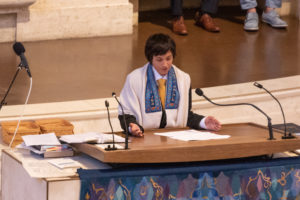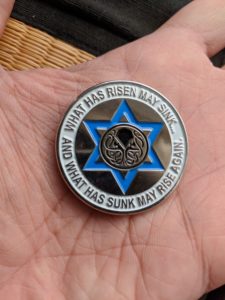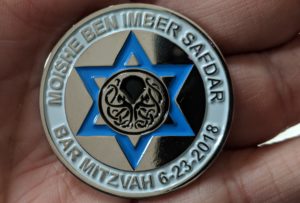The bar mitzvah drash of Moishe Ben Imber Safdar
At the bar mitzvah of a youth in Judaism, they are expected to give a short speech (a “drash”) about the Torah portion appropriate to that week. This is the one my son delivered at his bar mitzvah on June 23, 2018.
In my Torah portion Chukat, the Israelites are demanding water to survive in the desert. God tells Moses to speak to the rock and bring forth water. Instead, Moses beats the rock with his staff. Water pours out, but God is angry at Moses and punishes him by refusing to allow Moses to enter the Promised Land with the people.
What did Moses do wrong? Why such a harsh punishment? Medieval commentator Rashi imagines God saying, “For had you spoken to the rock and it had brought forth water I would have been sanctified before the whole congregation, for they would have said: What is the case with this rock which cannot speak and cannot hear and needs no maintenance?
It fulfils the bidding of the Omnipresent God!
How much more should we do so?”
I think God thought that Moses was becoming too powerful and overconfident. Moses makes it look like he is the one who controls the water, not God. This has the potential to move the people away from accepting God to instead following a human being as a human idol. This also can make others think that they too could have power over God.
Was God disappointed in Moses? Or Did God intend for this to happen?
I do not think that God foresaw that Moses would gain so much power in leading the people out of Egypt and yelling at a rock. But I do think that God intended Moses’ downfall, because God wanted Moses to lose power.
God does not want his acolyte to become a second god. God does not want any human being to think that they can become a god.
God does not want us to become a higher level species and make God just a tool.
I think God feels threatened by Moses for having so much power over a community.
To the point where God was able to foresee a future where the Jewish people worshiped the same God but with a new set of values that Moses would have created based of his actions.
That explains why God allows all of these bad things to happen in the world, to prevent his loss of power.
Is God all-knowing?
Is God perfect?
I don’t think that we want a truly all-powerful being in any religion.
It is disturbing to have the idea that something so perfect is at the same time fragile.
God has the ability to corrupt individuals, destroy the world and therefore Himself.
I can imagine that God is a neutral force.
God is not always working for the interest of the Jewish people, but for His own interest.
He does what He thinks will benefit Him. But God can only pull the strings to His benefit to a certain extent. God cannot manipulate us completely.
Despite this God has been kind to us and led us out of Egypt to the Holy Land and we owe Him for his actions.
So All of you should feel free to worship God as you please.
Ultimately, today’s coming of age ceremony is the time when young Jews wrestle with their beliefs and question them. So it is totally normal as the bar mitzvah boy for me to both lead us in prayers to God while also attacking His authority.
It is my way of being a Jew.
Introduction to Haftarah
My Haftarah portion comes from the Book of Judges, Chapter 11, Verses 1 to 3. It is about the Judge Jephthah (Jep-tah) and how his half-brothers cast him out because he is the son of a prostitute. But then they eventually return and beg for his help defeating the Ammonites. The connection to my Torah portion is that Numbers Chapter 21, Verses 21 to 25 gets repeated in Judges, Chapter 11, Verses 19 to 22, about invading Ammon and beating the King Sihon. You can find it on page 1268.
Thank you to Cantor Luck and Rabbi Carla, who helped me through this journey.
Thank you to My Mom and Dad, who encouraged me to be successful’
And thank you to all other friends and family who took time off to come to my bar-mitzvah.
As part of the Remember Us project, I will remember Phillip Hirsch. He lived in Rostock, in the Schwerin district, in the Mecklenburg region of Germany. His mother’s name was Meta and his father’s name was Willy. He died in the Shoah at Rostock. His age and the date when he died have not been recorded. I will remember him.


